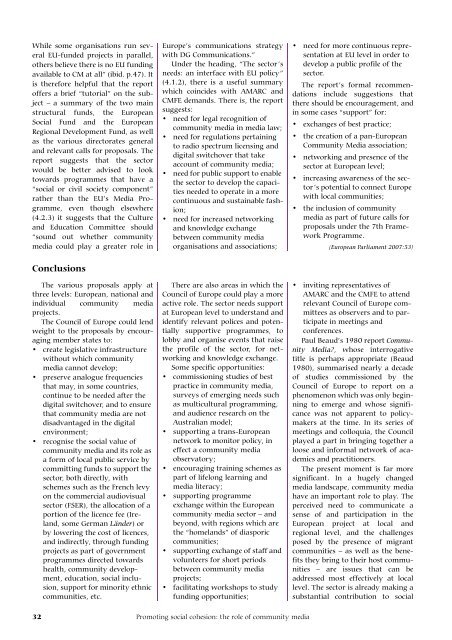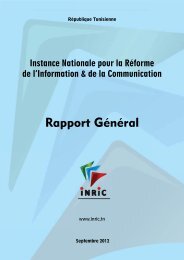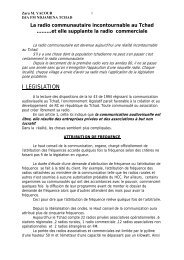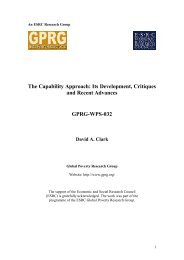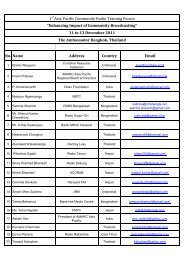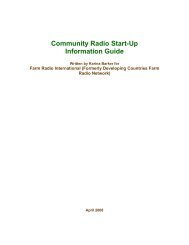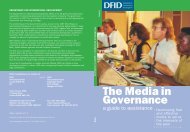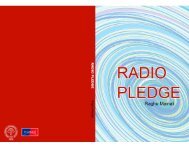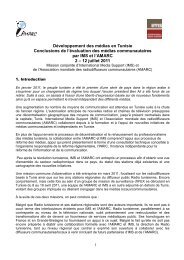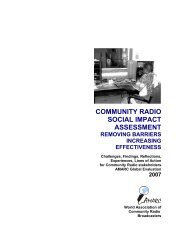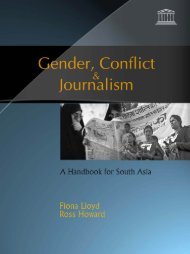Promoting social cohesion: the role of community media - amarc
Promoting social cohesion: the role of community media - amarc
Promoting social cohesion: the role of community media - amarc
- No tags were found...
Create successful ePaper yourself
Turn your PDF publications into a flip-book with our unique Google optimized e-Paper software.
While some organisations run severalEU-funded projects in parallel,o<strong>the</strong>rs believe <strong>the</strong>re is no EU fundingavailable to CM at all” (ibid. p.47). Itis <strong>the</strong>refore helpful that <strong>the</strong> report<strong>of</strong>fers a brief “tutorial” on <strong>the</strong> subject– a summary <strong>of</strong> <strong>the</strong> two mainstructural funds, <strong>the</strong> EuropeanSocial Fund and <strong>the</strong> EuropeanRegional Development Fund, as wellas <strong>the</strong> various directorates generaland relevant calls for proposals. Thereport suggests that <strong>the</strong> sectorwould be better advised to looktowards programmes that have a“<strong>social</strong> or civil society component”ra<strong>the</strong>r than <strong>the</strong> EU’s Media Programme,even though elsewhere(4.2.3) it suggests that <strong>the</strong> Cultureand Education Committee should“sound out whe<strong>the</strong>r <strong>community</strong><strong>media</strong> could play a greater <strong>role</strong> inEurope’s communications strategywith DG Communications.”Under <strong>the</strong> heading, “The sector’sneeds: an interface with EU policy”(4.1.2), <strong>the</strong>re is a useful summarywhich coincides with AMARC andCMFE demands. There is, <strong>the</strong> reportsuggests:• need for legal recognition <strong>of</strong><strong>community</strong> <strong>media</strong> in <strong>media</strong> law;• need for regulations pertainingto radio spectrum licensing anddigital switchover that takeaccount <strong>of</strong> <strong>community</strong> <strong>media</strong>;• need for public support to enable<strong>the</strong> sector to develop <strong>the</strong> capacitiesneeded to operate in a morecontinuous and sustainable fashion;• need for increased networkingand knowledge exchangebetween <strong>community</strong> <strong>media</strong>organisations and associations;• need for more continuous representationat EU level in order todevelop a public pr<strong>of</strong>ile <strong>of</strong> <strong>the</strong>sector.The report’s formal recommendationsinclude suggestions that<strong>the</strong>re should be encouragement, andin some cases “support” for:• exchanges <strong>of</strong> best practice;• <strong>the</strong> creation <strong>of</strong> a pan-EuropeanCommunity Media association;• networking and presence <strong>of</strong> <strong>the</strong>sector at European level;• increasing awareness <strong>of</strong> <strong>the</strong> sector’spotential to connect Europewith local communities;• <strong>the</strong> inclusion <strong>of</strong> <strong>community</strong><strong>media</strong> as part <strong>of</strong> future calls forproposals under <strong>the</strong> 7th FrameworkProgramme.(European Parliament 2007:53)ConclusionsThe various proposals apply atthree levels: European, national andindividual <strong>community</strong> <strong>media</strong>projects.The Council <strong>of</strong> Europe could lendweight to <strong>the</strong> proposals by encouragingmember states to:• create legislative infrastructurewithout which <strong>community</strong><strong>media</strong> cannot develop;• preserve analogue frequenciesthat may, in some countries,continue to be needed after <strong>the</strong>digital switchover, and to ensurethat <strong>community</strong> <strong>media</strong> are notdisadvantaged in <strong>the</strong> digitalenvironment;• recognise <strong>the</strong> <strong>social</strong> value <strong>of</strong><strong>community</strong> <strong>media</strong> and its <strong>role</strong> asa form <strong>of</strong> local public service bycommitting funds to support <strong>the</strong>sector, both directly, withschemes such as <strong>the</strong> French levyon <strong>the</strong> commercial audiovisualsector (FSER), <strong>the</strong> allocation <strong>of</strong> aportion <strong>of</strong> <strong>the</strong> licence fee (Ireland,some German Länder) orby lowering <strong>the</strong> cost <strong>of</strong> licences,and indirectly, through fundingprojects as part <strong>of</strong> governmentprogrammes directed towardshealth, <strong>community</strong> development,education, <strong>social</strong> inclusion,support for minority ethniccommunities, etc.There are also areas in which <strong>the</strong>Council <strong>of</strong> Europe could play a moreactive <strong>role</strong>. The sector needs supportat European level to understand andidentify relevant polices and potentiallysupportive programmes, tolobby and organise events that raise<strong>the</strong> pr<strong>of</strong>ile <strong>of</strong> <strong>the</strong> sector, for networkingand knowledge exchange.Some specific opportunities:• commissioning studies <strong>of</strong> bestpractice in <strong>community</strong> <strong>media</strong>,surveys <strong>of</strong> emerging needs suchas multicultural programming,and audience research on <strong>the</strong>Australian model;• supporting a trans-Europeannetwork to monitor policy, ineffect a <strong>community</strong> <strong>media</strong>observatory;• encouraging training schemes aspart <strong>of</strong> lifelong learning and<strong>media</strong> literacy;• supporting programmeexchange within <strong>the</strong> European<strong>community</strong> <strong>media</strong> sector – andbeyond, with regions which are<strong>the</strong> “homelands” <strong>of</strong> diasporiccommunities;• supporting exchange <strong>of</strong> staff andvolunteers for short periodsbetween <strong>community</strong> <strong>media</strong>projects;• facilitating workshops to studyfunding opportunities;• inviting representatives <strong>of</strong>AMARC and <strong>the</strong> CMFE to attendrelevant Council <strong>of</strong> Europe committeesas observers and to participatein meetings andconferences.Paul Beaud’s 1980 report CommunityMedia?, whose interrogativetitle is perhaps appropriate (Beaud1980), summarised nearly a decade<strong>of</strong> studies commissioned by <strong>the</strong>Council <strong>of</strong> Europe to report on aphenomenon which was only beginningto emerge and whose significancewas not apparent to policymakersat <strong>the</strong> time. In its series <strong>of</strong>meetings and colloquia, <strong>the</strong> Councilplayed a part in bringing toge<strong>the</strong>r aloose and informal network <strong>of</strong> academicsand practitioners.The present moment is far moresignificant. In a hugely changed<strong>media</strong> landscape, <strong>community</strong> <strong>media</strong>have an important <strong>role</strong> to play. Theperceived need to communicate asense <strong>of</strong> and participation in <strong>the</strong>European project at local andregional level, and <strong>the</strong> challengesposed by <strong>the</strong> presence <strong>of</strong> migrantcommunities – as well as <strong>the</strong> benefits<strong>the</strong>y bring to <strong>the</strong>ir host communities– are issues that can beaddressed most effectively at locallevel. The sector is already making asubstantial contribution to <strong>social</strong>32 <strong>Promoting</strong> <strong>social</strong> <strong>cohesion</strong>: <strong>the</strong> <strong>role</strong> <strong>of</strong> <strong>community</strong> <strong>media</strong>


